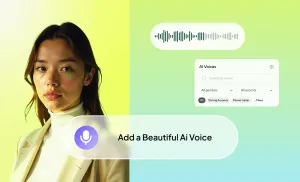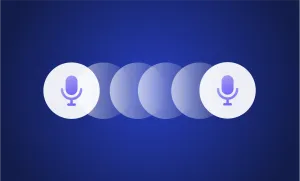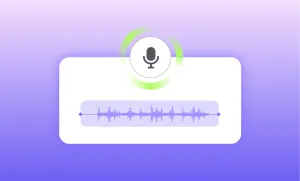AI-generated voices are showing up everywhere. Some sound robotic. Others are nearly indistinguishable from a real person. But as AI-generated voices become more realistic, a big question keeps coming up: who owns them?
Copyright laws were made for human-created work, which makes things complicated. If you record yourself speaking, that audio belongs to you. If an AI generates a voice, is it protected the same way? Can you use it freely? What happens if someone else uses an AI-generated voice that sounds like you?
These are the kinds of legal and ethical issues content creators need to think about before using AI voices in their work. Whether you’re narrating a YouTube video or creating an entire podcast using AI-generated speech, understanding copyright rules can help you avoid problems down the line.
The Basics: Can AI Voices Be Copyrighted?
Copyright protects original creative works. Music, books, videos, photography—if a human makes it, it can be copyrighted. AI-generated content is different.
Most copyright laws require a work to have a human author for it to qualify for protection. AI-generated voices don’t fit neatly into that definition, which leaves them in a legal gray area.
U.S. Copyright Office’s Stance
The U.S. Copyright Office has already ruled that purely AI-generated content cannot be copyrighted. If an AI writes a script or generates an image with no human involvement, it’s not considered an original work in the legal sense. The same logic applies to AI-generated voices.
If you create a podcast episode using an AI voice, the content of that episode belongs to you, but the AI-generated voice itself does not. You have the right to use it, but you don’t have exclusive ownership over it.
How AI Voice Licensing Works
AI voice platforms typically license their voices instead of giving full ownership to users. When you generate a voice with a tool like Podcastle, you get the right to use it, but the voice itself remains the property of the platform.
This means:
1) The company can set restrictions on how the AI voice is used.
2) The company can remove or modify voices at any time.
3) The AI voice you use might also be available to other creators.
Some platforms allow users to clone their own voices. Podcastle’s Voice Cloning feature, for example, lets users create an AI version of their own voice. In this case, users do retain ownership over the AI-generated output, but they still need to comply with legal and ethical guidelines.
Who Owns AI-Generated Voices?
Ownership of AI-generated voices depends on a few key factors:
1) Who created the original voice model?
2) Was the AI voice trained using real human recordings?
3) Did the user generate a unique AI voice, or is it a pre-existing AI model?
Let's dig into this a little deeper.
AI Voice Providers Control the Licensing
Companies that develop AI voices own the underlying technology and models. When you generate a voice using Podcastle, ElevenLabs, or any other platform, you’re using a licensed voice, not one you own outright.
If an AI-generated voice sounds natural, it’s likely built using recordings of real human voices. The person who originally provided those recordings doesn’t necessarily own the AI-generated output. Instead, the company that trained the AI model retains control.
This is why AI voice providers can set rules on how voices are used. Some platforms allow commercial use, while others limit it.
Ownership of Cloned Voices
Cloning your own voice is a different situation. If you record samples and create an AI-generated version of your voice using Podcastle’s Revoice, you own both the original recordings and the AI-generated output. However the AI voice model itself is still tied to the platform, meaning you can use your cloned voice, but you can’t claim ownership over the underlying technology that powers it.
The Problem with AI Celebrity Voices
Unless you've got a specific deal going on with a celebrity, using AI-generated voices that are supposed to be a 1 to 1 replica of famous people can lead to legal trouble. This is because celebrities, public figures, and even regular people can legally protect their voices from being used without consent.
Example: In 2023, Scarlett Johansson publicly criticized OpenAI for using an AI-generated voice that sounded just like her. Even though the voice wasn't supposed to be an exact copy (although we might never truly know what OpenAI was up to), the similarity raised ethical and legal concerns.
With that said, for content creators, AI celebrity voices can be risky territory when used for commercial or marketing reasons.
Using AI Voices in Content: What’s Legal and What’s Not?
Content creators use AI-generated voices for all kinds of projects—YouTube videos, podcasts, audiobooks, and marketing ads. The technology makes content creation faster and more accessible. But without understanding the legal side, creators could run into serious problems.
AI voice providers set licensing and copyright terms, and breaking those terms can lead to content takedowns or legal action. On top of that, different platforms have their own policies about AI-generated content.
1) Commercial vs. Non-Commercial Use
Not all AI voices are available for commercial projects. Some are restricted to personal use, meaning they can’t be used in monetized content like paid ads or premium podcast episodes.
AI voice licensing usually falls into one of these categories:
- Personal Use: Free or limited access, but content cannot be monetized.
- Commercial License: Allows monetization, but terms vary between platforms.
- Enterprise Use: Custom licensing agreements for businesses.
If an AI voice platform does not explicitly state that a voice can be used commercially, assume that it cannot. Using a voice in a way that violates licensing terms can result in content being removed, demonetized, or flagged for copyright issues.
2) Content Monetization & Platform Policies
AI-generated content is a hot topic for platforms like YouTube, TikTok, and Spotify. While AI voices are widely used, they are also being closely monitored by these platforms.
- YouTube: AI-generated voiceovers are allowed, but deceptive or misleading AI content can be flagged. If a video uses an AI-generated voice to impersonate someone, it could be taken down.
- TikTok: AI voiceovers are common, but any content that misrepresents someone or spreads false information can be flagged.
- Spotify & Apple Podcasts: AI-generated podcast voices are allowed, but any misleading AI content—such as deepfake interviews—can be removed.
Monetizing AI-generated voice content is allowed in most cases, but platforms do enforce rules against deceptive or unethical use. If an AI voice is used to imitate someone without permission, that content could be taken down.
3) Fair Use Considerations
Some creators assume that AI-generated voices fall under fair use, but this is rarely the case. Fair use applies to specific situations, like commentary, criticism, or education. It does not automatically protect AI-generated voices from legal claims.
For example:
- Parody & Satire: AI-generated voices might qualify as parody if they are used for comedic or satirical purposes. But if the voice is too realistic, it can still violate likeness rights.
- Deepfake Voiceovers: Even if AI-generated, a voice that sounds identical to a celebrity or public figure can be legally challenged.
Creators who use AI voices should always check platform guidelines and licensing terms to ensure they’re not violating any rules.
Risks of Using AI Voices Without Proper Rights
AI voice tools are widely available, but using them without understanding legal risks can lead to unexpected problems.
1) Legal Consequences
Violating AI voice licensing agreements can result in legal action. Some companies actively monitor how their AI-generated voices are used and send takedown notices if terms are broken.
- DMCA Takedowns: Podcastle, for example, enforces copyright via DMCA (Digital Millennium Copyright Act) and removes content that infringes on third-party rights.
- Lawsuits: AI-generated voices that imitate real people can lead to legal claims for likeness rights violations.
- Contract Violations: AI voice platforms have terms of service that users must follow. If those terms are broken, accounts can be suspended or banned.
Using AI voices without proper licensing can have serious consequences, especially for professional content creators who monetize their work. To reduce potential exposure, forming an LLC can help safeguard personal assets by separating individual and business liabilities in case of legal disputes related to content use.
2) Demonetization & Content Removal
Even if legal action isn’t taken, platforms can still demonetize or remove content that violates their AI policies.
- YouTube videos using unlicensed AI voices can be flagged for copyright issues.
- Podcasts featuring AI-generated celebrity impersonations can be removed from platforms like Spotify.
- TikTok videos using AI voiceovers in misleading ways can be shadowbanned or taken down.
For creators relying on content monetization, losing access to a platform—or having content flagged—can result in significant revenue loss.
3) Brand & Ethical Risks
AI voice misuse is also a branding risk. If an audience discovers that a creator deceptively used an AI-generated voice, it can lead to backlash.
Ethical concerns include:
1) Using AI voices to fake interviews or conversations.
2) Using AI-generated voices in political content without disclosure.
3) Using AI voices to imitate real people without permission.
Even when legal, misleading AI content can damage a creator’s credibility.
How to Use AI Voices Safely
AI voices make content creation easier, but using them without the right precautions can lead to trouble. Whether you’re narrating a podcast, creating YouTube videos, or experimenting with AI-generated characters, following best practices can help you avoid copyright claims, licensing issues, or platform takedowns.
Here’s how to use AI voices legally, ethically, and without worry.
1) Check Licensing Agreements Before Using AI Voices
Every AI voice tool has terms of service that explain how their voices can be used. Some platforms allow commercial use, while others limit AI-generated voices to personal projects.
When using an AI voice, ask yourself:
- Does the platform allow commercial use? If you’re monetizing content, check whether your license allows it.
- Are there restrictions on redistribution? Some platforms don’t allow AI-generated voices to be resold or used in audiobooks, ads, or paid content.
- Does the AI voice provider require attribution? Some tools ask creators to credit the AI voice generator in their content.
2) Use Licensed AI Voice Platforms
Not all AI voice generators are built the same way. Some platforms use legally licensed voice models, while others scrape data from the internet and train their AI without permission.
Using an unlicensed AI voice could mean:
- The voice was trained on copyrighted content, making it legally questionable.
- The company providing the voice could get shut down, removing access to your content.
- A legal claim could force you to take down content that used the AI voice.
Creators should stick to AI voice tools that explicitly state how their voices are sourced. Platforms like Podcastle provide licensed AI voices and allow users to create AI versions of their own voice through Revoice.
3) Avoid Copyright & Likeness Infringement
Even though AI-generated voices aren’t protected by copyright, using them improperly can still lead to legal trouble.
Here’s what to avoid:
- Using AI voices that replicate real people without permission. If an AI voice sounds exactly like a celebrity or public figure, it can violate likeness rights.
- Using AI-generated voices in misleading ways. Deepfake audio that misrepresents someone or spreads false information can get flagged or removed.
- Editing AI voices to bypass restrictions. Some platforms prohibit modifying AI-generated voices to sound like a specific person. Altering a voice to get around these rules can still lead to legal claims.
Future of AI Voice Copyright: What’s Next?
AI voice technology is moving fast, and copyright laws are struggling to keep up. Governments, courts, and tech companies are all debating how to regulate AI-generated content.
Here’s what creators should watch for in the coming years:
1) Will AI-Generated Voices Ever Be Copyrighted?
Right now, copyright laws in most countries require human authorship. But some legal experts believe that AI-generated works could eventually get limited copyright protections.
Possible changes include:
- Co-Copyright Models: Laws that allow AI-generated content to be copyrighted if there is significant human involvement.
- AI Voice Model Protections: New laws that prevent AI-generated voices from being used without consent (especially for public figures).
- Stronger Fair Use Guidelines: Clearer rules on when AI-generated voices can be used for parody, satire, or commentary.
2) More AI Regulations from Governments & Platforms
AI voices are already raising concerns about deepfakes, misinformation, and impersonation. To combat these issues, governments and tech platforms are stepping in.
- Europe’s AI Act is one of the first major regulations targeting AI-generated content. It may set global standards for how AI voices are used and disclosed.
- YouTube & Social Media Platforms are expected to roll out more AI voice restrictions, especially for political content and monetization.
- Celebrity & Brand Lawsuits against AI voice companies could push for stricter regulations on voice cloning and imitation.
Creators using AI voices should stay updated on these changes to ensure they remain compliant.
3) Ethical Use of AI Voices Will Matter More Than Ever
As AI-generated voices become more common, audiences will start expecting more transparency about their use.
Some platforms already require disclaimers when AI-generated content is used. This trend is likely to grow, especially in:
- Podcasts & Audiobooks: Listeners may want to know if they are hearing a real person or an AI-generated voice.
- Advertising & Marketing: Brands that use AI voices may need to disclose it to consumers.
- News & Educational Content: AI voices in factual content could require clear labeling to prevent misinformation.
For creators, the safest approach is to use AI voices responsibly and be upfront about how they are used.
How to Use AI Voices with Podcastle
AI-generated voices are powerful tools, but using them responsibly is key. Podcastle provides licensed AI voices, so creators can produce high-quality content without legal concerns.
Step 1: Understand Licensing
Podcastle’s AI voices are fully licensed, meaning creators can legally use them in their projects. Unlike some tools that scrape unlicensed audio, Podcastle ensures compliance with copyright and likeness laws.
Step 2: Choose the Right AI Voice
Select from Podcastle’s 200+ AI voices or use Voice Cloning to generate an AI version of your own voice. For commercial projects, ensure the voice aligns with licensing terms.
Step 3: Follow Platform Rules
Before publishing AI-narrated content, check YouTube, Spotify, or TikTok’s guidelines to avoid takedowns. Impersonating real people or using AI voices in misleading ways can lead to restrictions.
Step 4: Keep Licensing Records
Save Podcastle’s terms of service and any proof of licensing. If a copyright or licensing dispute arises, having documentation ensures your rights are protected.
Step 5: Publish & Distribute
Podcastle’s Hosting Hub lets you publish AI-generated content directly to Spotify, Apple Podcasts, and more—making legal, high-quality distribution seamless.
Final Thoughts
AI-generated voices are transforming content creation, making high-quality narration more accessible than ever. But copyright laws haven’t caught up yet, which means creators need to be careful about how they use AI voices in their work.
Before using an AI-generated voice, remember:
- AI voices aren’t automatically protected by copyright. The voice provider owns the underlying model, and creators have a license to use it.
- Using an AI voice commercially requires the right license. Not every AI-generated voice can be used for monetized content.
- Mimicking real people can lead to legal trouble. Public figures and celebrities have likeness rights that prevent their voices from being copied without consent.
- Platform rules matter. YouTube, TikTok, and other platforms are cracking down on AI-generated content that violates their guidelines.
Creators who stay informed, use licensed AI voices, and follow ethical guidelines will have fewer risks and more creative opportunities. AI voices are powerful tools, but using them the right way is what keeps content creators safe and successful.








